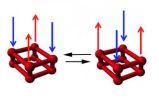(Press-News.org) A new study published today in the journal PNAS (Proceedings of the National Academy of Sciences), has found that time of day and sleep deprivation have a significant effect on our metabolism. The finding could be crucial when looking at the best time of day to test for diseases such as cancer and heart disease, and for administering medicines effectively.
Researchers from the University of Surrey and The Institute of Cancer Research, London, investigated the links between sleep deprivation, body clock disruption and metabolism, and discovered a clear variation in metabolism according to the time of day.
Healthy male volunteers were put in an environment where light, sleep, meals and posture were controlled. Researchers collected blood samples every two hours to show how metabolic biomarkers change during the day. For the first 24 hours, the participants experienced a normal wake/sleep cycle. This was followed by 24 hours of wakefulness, to investigate the effect of sleep deprivation on metabolic rhythms. The results showed that metabolic processes are significantly increased during sleep deprivation. 27 metabolites, including serotonin, were found at higher levels in periods of sleep deprivation compared to levels during sleep.
Lead author Professor Debra Skene from the University of Surrey, said: "Our results show that if we want to develop a diagnostic test for a disease, it is imperative to take the time of day when taking blood samples into account, since this has a significant effect on metabolism. This is also key for administering medicines and determining when they will be at their most effective. Of course, this will have to be considered on a case-by-case basis, since many people such as shift workers will have a different sleep/wake cycle and timings will need to be adapted to their body clocks."
Co-Senior author, Dr Florence Raynaud, a group leader at The Institute of Cancer Research, London, said: "The study made accurate measurements of a large number of metabolites as they varied by time of day and under different sleep patterns. Our findings are likely to be important in interpreting the results of blood tests, and in understanding why some individuals respond differently to medication. They also set reference points for future studies looking at the connection between metabolic processes and diseases such as cancer."
The research was funded by a grant from the BBSRC awarded to a large team of researchers, and was conducted at the University of Surrey's Faculty of Health and Medical Sciences and at The Institute of Cancer Research, London.
Media enquiries: Peter La, Media Relations Office at the University of Surrey, Tel: 01483 689191 or E-mail: p.la@surrey.ac.uk
Notes to Editors:
About the University of Surrey
The University of Surrey is one of the UK's leading professional, scientific and technological universities with a world class research profile and a reputation for excellence in teaching and research. Ground-breaking research at the University is bringing direct benefit to all spheres of life – helping industry to maintain its competitive edge and creating improvements in the areas of health, medicine, space science, the environment, communications, defence and social policy. Programmes in science and technology have gained widespread recognition and it also boasts flourishing programmes in dance and music, social sciences, management and languages and law. In addition to the campus on 150 hectares just outside Guildford, Surrey, the University also owns and runs the Surrey Research Park, which provides facilities for 110 companies employing 2,750 staff.
INFORMATION:
About The Institute of Cancer Research, London
The Institute of Cancer Research, London, is one of the world's most influential cancer research institutes.
Scientists and clinicians at The Institute of Cancer Research (ICR) are working every day to make a real impact on cancer patients' lives. Through its unique partnership with The Royal Marsden Hospital and 'bench-to-bedside' approach, the ICR is able to create and deliver results in a way that other institutions cannot. Together the two organisations are rated in the top four cancer centres globally.
The ICR has an outstanding record of achievement dating back more than 100 years. It provided the first convincing evidence that DNA damage is the basic cause of cancer, laying the foundation for the now universally accepted idea that cancer is a genetic disease. Today it leads the world at isolating cancer-related genes and discovering new targeted drugs for personalised cancer treatment.
As a college of the University of London, the ICR provides postgraduate higher education of international distinction. It has charitable status and relies on support from partner organisations, charities and the general public.
The ICR's mission is to make the discoveries that defeat cancer. For more information visit http://www.icr.ac.uk
Time of day crucial to accurately test for diseases, new research finds
2014-07-07
ELSE PRESS RELEASES FROM THIS DATE:
The quantum dance of oxygen
2014-07-07
Perhaps not everyone knows that oxygen has – quite unusually for such a simple molecule – magnetic properties. The phase diagram of solid oxygen at low temperatures and high pressures shows, however, several irregularities (for example, proper "information gaps" with regard to these magnetic properties) that are still poorly understood. A team of researchers from the International School for Advanced Studies (SISSA) and International Centre for Theoretical Physics Abdus Salam (ICTP) of Trieste, while trying to understand the origin of these phenomena, have identified a ...
DNA of 'Evolution Canyon' fruit flies reveals drivers of evolutionary change
2014-07-07
Scientists have long puzzled over the genetic differences between fruit flies that live hardly a puddle jump apart in a natural environment known as "Evolution Canyon" in Mount Carmel, Israel.
Now, an international team of researchers led by scientists with the Virginia Bioinformatics Institute at Virginia Tech has peered into the DNA of these closely related flies to discover how these animals have been able to adapt and survive in such close, but extremely different, ecologies.
One reason lies in a startling abundance of repetitive DNA elements that, until recently, ...
High earners in a stock market game have brain patterns that can predict market bubbles
2014-07-07
If you're so smart, why aren't you rich? It may be that, when it comes to stock market success, your brain is heeding the wrong neural signals.
In a study in the Proceedings of the National Academy of Sciences this week, scientists at the Virginia Tech Carilion Research Institute and Caltech found that, when they simulated market conditions for groups of investors, economic bubbles — in which the price of something could differ greatly from its actual value — invariably formed.
Even more remarkably, the researchers discovered a correlation between specific brain activity ...
Negar Sani solved the mystery of the printed diode
2014-07-07
VIDEO:
The video shows how a printed label picks up the radio signal from a telephone making a call, and uses the energy to switch the integrated display. This is only...
Click here for more information.
With an article published in the Proceedings of the National Academy of Sciences in the United States of America (PNAS), a thirteen-year-long mystery that has involved a long series of researchers at both Linköping University and Acreo Swedish ICT has finally been solved.
The ...
Neuroeconomists confirm Warren Buffett's wisdom
2014-07-07
Investment magnate Warren Buffett has famously suggested that investors should try to "be fearful when others are greedy and be greedy only when others are fearful."
That turns out to be excellent advice, according to the results of a new study by researchers at Caltech and Virginia Tech that looked at the brain activity and behavior of people trading in experimental markets where price bubbles formed. In such markets, where price far outpaces actual value, it appears that wise traders receive an early warning signal from their brains—a warning that makes them feel uncomfortable ...
Smart and socially adept
2014-07-07
Wanted: Highly skilled individual who is also a team player. In other words, someone who knows his or her stuff and also plays well with others.
Two qualities are particularly essential for success in the workplace: book smarts and social adeptness. The folks who do well tend to demonstrate one or the other. However, according to research conducted by UC Santa Barbara economist Catherine Weinberger, the individuals who reach the highest rungs on the corporate ladder are smart and social. Her findings appear in a recent online issue of the Review of Economics and Statistics.
Weinberger, ...
The tortoise and the hare: A sex difference in marathon pacing
2014-07-07
ALLENDALE, Mich. — Men are more likely than women to slow their pace in the marathon, according to a new study led by a Grand Valley State University researcher. The findings were published in Medicine & Science in Sports & Exercise.
The study, led by Robert Deaner, associate professor of psychology at Grand Valley State, was based on 14 marathons that occurred in the U.S. in 2011, and it included almost 92,000 performances. On average, men ran the second half of the marathon 15.6 percent slower than the first half, whereas women slowed by an average of 11.7 percent. ...
Slim down for the health of it and possibly reduce your hot flashes in the process
2014-07-07
CLEVELAND, Ohio (July 7, 2014)—Now women have yet one more incentive to lose weight as a new study has shown evidence that behavioral weight loss can help manage menopausal hot flashes.
The pilot study, which was published online last month in Menopause, the journal of The North American Menopause Society (NAMS), consisted of 40 overweight or obese white and African-American women with hot flashes, which are the most prevalent symptom of menopause. In fact, more than 70% of women report hot flashes during the menopausal transition, with many of these women reporting frequent ...
US scientists don't publish articles about potential role of innate variation in athletic performance
2014-07-07
ALLENDALE, Mich. — Compared to scientists working in other countries, U.S.-based scientists are underrepresented as authors of articles on the potential role of innate variation in athletic performance that are published in peer-reviewed science journals, according to Grand Valley State University researchers.
The findings are published in the online journal SpringerPlus.
The research, conducted by Michael P. Lombardo, professor of biology, and Shadie Emiah, a Grand Valley State graduate student, used information about the authors of 290 articles published in peer-reviewed ...
Of non-marijuana drug users in the ER, nearly all are problem drug users
2014-07-07
WASHINGTON —Of emergency patients who reported any drug other than marijuana as their primary drug of use, 90.7 percent met the criteria for problematic drug use. Among patients who reported cannabis (marijuana) as their primary drug, almost half (46.6 percent) met the criteria for having a drug problem, according to a study published online Thursday in Annals of Emergency Medicine ("Identifying Patients with Problematic Drug Use in the Emergency Department: Results of a Multi-Site Study.)
"Of patients who reported any drug use in the previous 30 days, nearly two-thirds ...




